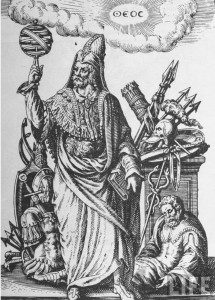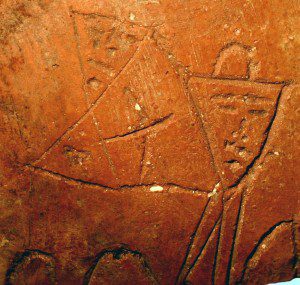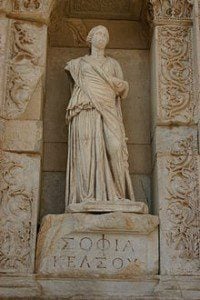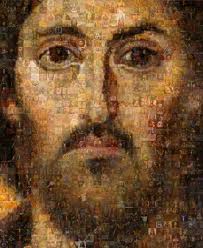 I don’t worship Jesus, but I’ll always defend the rights of Pagans to do so if they so choose. I don’t have a stranglehold on truth, nor do any other Pagans I know. Certainly there are those who can define truth in their specific traditions, but in the general scheme of eclectic Paganism it’s just not possible. There are certain things that bind us together, and there are certainly things that also help to pull us apart.
I don’t worship Jesus, but I’ll always defend the rights of Pagans to do so if they so choose. I don’t have a stranglehold on truth, nor do any other Pagans I know. Certainly there are those who can define truth in their specific traditions, but in the general scheme of eclectic Paganism it’s just not possible. There are certain things that bind us together, and there are certainly things that also help to pull us apart.
One of the most damning forces in Modern Paganism is the fundamentalist Pagan whose definitions exclude and limit rather than include and open. Sam Webster who writes here on Patheos Pagan falls into the more fundamentalist camp. He writes as if his truths are the only ones that matter, and are universal to all of Paganism. One of the reasons I write at Patheos Pagan and not on an island is because I believe I can be a constructive voice not just amont Pagans, but among a variety of faiths. When writing about Christianity I try to do so with respect, and sometimes even admiration. There are certainly many Christians out there who support us as Pagans. Writing that all of Christianity wants to destroy my faith doesn’t just block paths to understanding, it blows up bridges.
It was with great sadness that I read Sam’s “Why You Can’t Worship Jesus Christ and Be Pagan.” It saddened me because it expressed such a small view of not just Jesus and Christianity, but Paganism as well. I love the sacred no matter its source, and I value the experiences of my Sisters and Brothers in Paganism, even when we worship different deities or use different ritual structures.
From the very start of the article I found myself disagreeing with Webster. To my eyes his definition of Paganism has serious issues. I realize that it’s near impossible to sum up Modern Paganism in just a few sentences, but if you are going to attempt it you have to do better. The definition of Contemporary Paganism is something I take very seriously, which is why I’ve dedicated over 1000 words to it here. Sam writes:
In short, the term “Pagan” only applies to that complex of religions that develop starting with the Renaissance and eventually call themselves Pagan. It does not apply to the ancients, or to cultures outside the European, Mediterranean, and Mesopotamian region. Neither the ancient pre-Christian religions nor those foreign to the aforesaid region call themselves “pagan,” and while they have much in common, they are each distinct and should be referred to by their proper names. Contemporary Paganism is derived from the occult revival that began with the Florentine Renaissance and is a uniquely modern phenomenon.
Webster is right that the ancients did not call themselves “Pagans,” and I’d argue against calling Hindus or practitioners of Native American spiritualities “Pagans” as they wouldn’t use that term themselves. After that our disagreements begin. While I believe that Modern Paganism is mostly a modern construction, most Pagan faiths (especially Wicca) can trace their origins to the Western Magical Tradition as a whole. Many Pagan rituals and magical structures have evolved over thousands of years. There was no “dark age” for magic, and people were still writing and performing spells before the Renaissance.
 The Western Magical Tradition shaped Modern Paganism, and it wasn’t a tradition that suddenly went underground in the year 381 CE and then bubbled up again during the Renaissance. The WMT transformed, hid some of its (ancient) pagan clothing and re-emerged as a practical tool within Christian traditions. As Owen Davies writes in Grimoires: A History of Magical Books:
The Western Magical Tradition shaped Modern Paganism, and it wasn’t a tradition that suddenly went underground in the year 381 CE and then bubbled up again during the Renaissance. The WMT transformed, hid some of its (ancient) pagan clothing and re-emerged as a practical tool within Christian traditions. As Owen Davies writes in Grimoires: A History of Magical Books:
“While the Church was ultimately successful in defeating pagan worship it never managed to demarcate clearly and maintain a line of practice between religious devotion and magic. The medical manuals known as leechbooks, which were produced by clergy or monastic communities of late Anglo-Saxon England, are a good example. They were based principally on classical medicine but also contained spells for healing and protection. How else was one to deal with malicious elves for instance? Some of the charms were Christianized versions of pagan healing verses.” (emphasis by Mankey) (1)
I’m not arguing that everything in Modern Paganism comes from an unbroken chain of secret pagan religion, but I can show a line of thought from Gerald Gardner to Hermes Trismegistus.
Once we get past out differences on the definition of Modern Paganism, Webster writes:
Fundamentally, Paganism is disjunct from Christianity. A person can only be one or the other. While technically a Pagan is not forbidden to worship Jesus Christ (but shouldn’t or wouldn’t, see below), Christians are condemned to eternal punishment if they worship anyone other than the persons of the Trinity. If you are Christian, worshiping other Gods is one of the most massive sins you can commit. (See Ex 22:20—”He that sacrificeth unto any god, save unto the LORD only, he shall be utterly destroyed”; also 1 Jn 5:21; 1 Cor 10:20; Dt 32:17; Ex 32:1-6; 1 Kgs 12:28-30.) . . . . . If, as a Christian, you think you can dodge this problem, you will have to answer to your God. He forbids the worship of other Gods, as well as magic, divination, astrology, and so forth, under pain of damnation. These scriptures dispose of the Christian side of the equation: You can’t be a Christian and do Pagan things.
 This whole paragraph makes a rather simplistic inference; basically saying that Christianity and Judaism are completely static and do not progress or regress. Yahweh has a long history of being worshipped side by side with other deities, most specifically his wife Asherah. The blessings of “Yahweh and his Asherah” were things that ancient Hebrews asked for. There is also evidence to suggest that Asherah was worshipped side by side with her husband in the First Temple. If people can re-construct ancient Norse religion, why can’t they re-construct an ancient Judaism that has been mostly lost, a Judaism that included both a Lord and a Lady?
This whole paragraph makes a rather simplistic inference; basically saying that Christianity and Judaism are completely static and do not progress or regress. Yahweh has a long history of being worshipped side by side with other deities, most specifically his wife Asherah. The blessings of “Yahweh and his Asherah” were things that ancient Hebrews asked for. There is also evidence to suggest that Asherah was worshipped side by side with her husband in the First Temple. If people can re-construct ancient Norse religion, why can’t they re-construct an ancient Judaism that has been mostly lost, a Judaism that included both a Lord and a Lady?
History is written by conquerors, I get that. The most common forms of Christianity look rather intolerant, but it wasn’t always that way. Sam is basically saying that if you are a Pagan who follows/worships Jesus you are limited to only the (canonical) New and Old Testaments. There were probably hundreds of gospels at one point in the development of Christianity, and many of them suggested radical and completely different cosmologies from what would become orthodox Christianity. It’s certainly difficult to be a Catholic Christian and a Pagan (though that doesn’t stop adherents of Santeria or Voudun from mixing the two faiths), but the tapestry of Christianity is far more complex than Webster is willing to admit. I’ve used the Gnostic text The Thunder, Perfect Mind in ritual for years:
For I am the first and the last.
I am the honored one and the scorned one.
I am the whore and the holy one.
I am the wife and the virgin.
I amand the daughter.
I am the members of my mother.
I am the barren one
and many are her sons.
I am she whose wedding is great,
and I have not taken a husband.
I am the midwife and she who does not bear.
I am the solace of my labor pains.
I am the bride and the bridegroom,
and it is my husband who begot me.
I am the mother of my father
and the sister of my husband
and he is my offspring.
Those words certainly work within the context of Modern Paganism and they come from sources that would have considered themselves Christian. Everything old is new again. As Elaine Pagels notes in her book the Gnostic Gospels:
“One group of gnostic sources claims to have received a secret tradition from Jesus through James and through Mary Magdalene. Members of this group prayed to the divine Father and Mother: ‘From Thee, Father, and through Thee, Mother, the two immortal names, Parents of the divine being, and thou, dweller in heaven, humanity, of the might name . . .'” (2)
Pagels offers even more examples like this in the chapter “God the Father/God the Mother.” Certainly not all Christians were limited to a worldview that only exalted three aspects of deity. Modern Paganism is not just “Wicca,” similarly Christianity is not just limited to the dominant Catholic and Protestant interpretations of 2013.
 The Gnostic text The Creation of the World and the Demiurge Ialdabaoth makes references to a whole cosmology of deities. The book begins with the words “Since everyone-the gods of the world and men-” making an implicit reference to a world full of deity, and deity with separate consciousnesses. The author continues “After the nature of the immortals was completed out of the boundless one, then a likeness called Sophia flowed out of Pistis.” The text continues on and on, with more figures and more deities, until eventually there is an entire cosmic hierarchy of gods. This is pretty common in many texts that are referred today as “Gnostic Christian.”
The Gnostic text The Creation of the World and the Demiurge Ialdabaoth makes references to a whole cosmology of deities. The book begins with the words “Since everyone-the gods of the world and men-” making an implicit reference to a world full of deity, and deity with separate consciousnesses. The author continues “After the nature of the immortals was completed out of the boundless one, then a likeness called Sophia flowed out of Pistis.” The text continues on and on, with more figures and more deities, until eventually there is an entire cosmic hierarchy of gods. This is pretty common in many texts that are referred today as “Gnostic Christian.”
As a hard-core polytheist I believe in the reality of many gods. Often times my interpretation of those gods does not match up exactly with someone else who worships those same gods. I once commented to someone that perhaps “there were many Pans?” By saying that I’m implying that the gods are not limited in the way we humans are. How deity chooses to reveal its self to you may not be the same way that deity reveals its self to me. To suggest that “all Jesus’s are the same Jesus” is limiting deity in a way that I don’t think deity can be limited. The Jesus of the Greek Orthodox Church is obviously not the same Jesus as that of The Church of Latter-Day Saints (Mormons). Why would a Pagan interpretation of Jesus have to be the same Jesus as that of the Baptist Church?
Webster writes:
Technically worship strengthens that which is worshiped (see my blog) both in the world and in the life of the worshiper. Thus worshiping any or all of the Trinity makes you more Christian and less Pagan. This looks good to Christians. Christianity and its God desire our (that is, Pagans and everybody else) elimination through ideological imperialism and ethnocide; all must be converted.
Perhaps worshipping a more tolerant view of Jesus will strengthen that version of the deity? I don’t understand why worshipping a “Universal Jesus” who expounds the Beatitudes helps the Jesus of the Tea Party. If a Pagan Christian interpretation of the Trinity includes “Mother, Father, and Tolerant Jesus” how is that hurting anyone? There are Christian traditions which suggest that Jesus might have had a homosexual relationship. Honoring that interpretation (or perhaps truth, who knows?) opens a door towards tolerance and modernity. I for one want to see that door open up, and that version of Christ rise triumphant.
It’s hard for me to even comment on lines like “Christianity and its God desire our (that is, Pagans and everybody else) elimination through ideological imperialism and ethnocide; all must be converted.” That turns Paganism into some sort of paranoid reactionary faith. I don’t think that Christianity and its God desire my elimination, certainly the majority of Christians I know aren’t towing that line. Lines like this again suggest a rigidness, that there is “one true Christianity” and “one true interpretation of Jesus” and apparently only Sam Webster and the Evangelical Wing of the Christian church possess it.
It’s a mistake to blame Christianity for greed and the human capacity for cruelty. There were wars in ancient paganism, and today there are people who I think are miserable, violent Pagans. There are bad guys in every religious group, just as there are tolerant and forgiving folks in nearly every religious group. Sam would label all of Christianity as destructive:
Some will ask, what’s wrong with mixing a bit of Christ in our Paganism? The Gospel story is not one of love and peace, that’s just the public relations. The history of Christianity shows the true character of Christianity and its Deity: the destruction of civilizations and cultures, and the slaughter of innumerable humans as savages, infidels, or simply heretics. Then there is the subtler problem of Missionary Paganism, destruction by infiltration and dilution. They come and preach the nice stuff, and so we include Christian worship with ours, but slowly they teach that the Old Ways should be abandoned for Christianity. Eventually, only the old people know the old ways, and when they die off only Christians are left: the old ways are destroyed. Just ask the Indians of the Americas, just ask the Hawaiians, just ask the Africans.
Monotheism has issues. It suggests a “one way or the high way” type of thinking, and it certainly has influenced thousands of human beings to act badly, but much of that bad behavior needs to be placed at the feet of human failures, failures such as racism, greed, and envy. I love the Roman Empire, it also enslaved and killed (tens of) thousands of people, it also had little tolerance for religions that it believed threatened the state (most notably that of Bacchus in the Second Century). Religion is easily corruptible, and at the beginning of the 20th Century there were a few faiths that might have been categorized as “Pagan” that most of us would have had massive disagreements with. Most Christians don’t give two shits what you or I do or think. They have their faith, and the majority of them want us to be free to have our own.
That’s not to say that there aren’t problems. Christian intolerance in the Third World (and with those that journey out from it) is a very real problem. Virulent, judgmental, and violent strains of Christianity are taking root in places such as Africa and South America, but it could be argued that much of that isn’t the result so much of Christianity, but the result of ignorance and superstition. There are many cultures that are currently being drug into the 19th Century kicking and screaming, they don’t share 20th Century values, let alone 21st Century ones. Our role in such cases is to be vigilant, aware, and to apply pressure and education to see that such stupidity doesn’t continue. Webster is correct in his scorn for Christian missionaries, but there have also been many Christians who have taken an active role in preserving indigenous belief systems.
I think it’s also important to note that just because “Christians” have operated a certain way, that doesn’t mean that’s what Jesus would have intended. Just because his followers have forgotten the Beatitudes doesn’t make them any less relavent when discussing Christianity.
The Beatitudes
Blessed are the poor in spirit, for theirs is the kingdom of heaven.
Blessed are those who mourn, for they will be comforted.
Blessed are the meek, for they will inherit the earth.
Blessed are those who hunger and thirst after righteousness,
for they will be filled.Blessed are the merciful, for they shall be shown mercy.
Blessed are the pure in heart, for they will see God.
Blessed are the peacemakers, for they will be called the sons of God.
Blessed are those who are persecuted because of righteousness, for theirs is the kingdom of heaven.
Blessed are you when people insult you, persecute you and falsely say all kinds of evil against you because of me. Rejoice and be glad, because great is your reward in heaven, for in the same way they persecuted the prophets who were before you.
Those don’t sound like the words of someone seeking to end my very existence.
One of my major pet peeves in Paganism comes from those Pagans who decry others for their lack of seriousness. Some people just want to practice an “Eclectic White Light Wicca,” and gods bless them! Who does that hurt? Who is to say that their gods aren’t completely happy with this arrangement? Sam says “I suggest you invoke more: the Gods will save you from this delusion,” I suggest you do the same thing, but I’m not going to tell you how they are going to answer. Only you and they know the answer, and only they and you know what’s right for you. I want to sing the praises of Pan everywhere I go, but that’s not a path that everyone is going to choose to be a part of.
Speaking of Pan, Jesus is partially responsible for his return to the Modern World. When people began to feel disconnected from the natural world the 19th Century they looked to Pan as a way to connect with it. As one writer put it “Pan is my earthly shepherd, and Jesus is my heavenly one.” There were no arguments between the gods over this arrangement. Pan was there with them as they ran through the woods, and Jesus touched their shoulders as they prayed to the heavens. That arrangement has worked for a whole bunch of people the last 200 years. It doesn’t have to work for you personally, and you are certainly free to judge it, but that’s only your opinion. I’m a Pagan, and there are no obstacles between myself and the divine. How I encounter that divine is my journey, and I’ll have whatever co-pilots I want.
Jesus and Pan ~ A Dream of Sarkis, an old Greek shepherd called ‘the madman’ ~ by Kahlil Gibran
In a dream I saw Jesus and My God Pan sitting together in the heart of the forest.
They laughed at each other’s speech, with the brook that ran near them, and the laughter of Jesus was the merrier. And they conversed long.
Pan spoke of earth and her secrets, and of his hoofed brothers and his horned sisters; and of dreams. And he spoke of roots and their nestlings, and of the sap that wakes and rises and sings to summer.
And Jesus told of the young shoots in the forest, and of flowers and fruit, and the seed that they shall bear in a season not yet come.
He spoke of birds in space and their singing in the upper world.
And He told of white harts in the desert wherein God shepherds them.
And Pan was pleased with the speech of the new God, and his nostrils quivered.
And in the same dream I beheld Pan and Jesus grow quiet and still in the stillness of the green shadows.
And then Pan took his reeds and played to Jesus.
The trees were shaken and the ferns trembled, and there was a fear upon me.
And Jesus said, “Good brother, you have the glade and the rocky height in your reeds.”
Then Pan gave the reeds to Jesus and said, “You play now. It is your turn.”
And Jesus said, “These reeds are too many for my mouth. I have this flute.”
And He took His flute and He played.
And I heard the sound of rain in the leaves, and the singing of streams among the hills, and the falling of snow on the mountain-top.
The pulse of my heart, that had once beaten with the wind, was restored again to the wind, and all the waves of my yesterdays were upon my shore, and I was again Sarkis the shepherd, and the flute of Jesus became the pipes of countless shepherds calling to countless flocks.
Then Pan said to Jesus, “Your youth is more kin to the reed than my years. And long ere this in my stillness I have heard your song and the murmur of your name.
“Your name has a goodly sound; well shall it rise with the sap to the branches, and well shall it run with the hoofs among the hills.
And it is not strange to me, though my father called me not by that name. It was your flute that brought it back to my memory.
“And now let us play our reeds together.”
And they played together.
And their music smote heaven and earth, and a terror struck all living things.
I heard the bellow of beasts and the hunger of the forest. And I heard the cry of lonely men, and the plaint of those who long for what they know not.
I heard the sighing of the maiden for her lover, and the panting of the luckless hunter for his prey.
And then there came peace into their music, and the heavens and the earth sang together.
All this I saw in my dream, and all this I heard.
1. Grimoires: A History of Magic Books by Owen Davies. pages 21-22
2. The Gnostic Gospels by Elaine Pagels. page 49.













